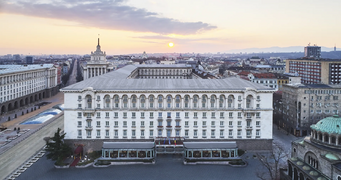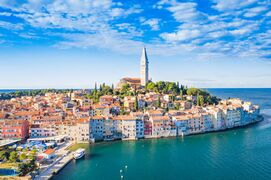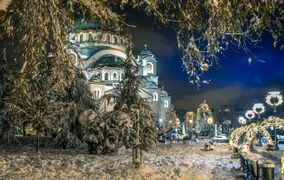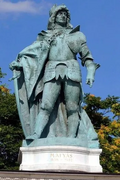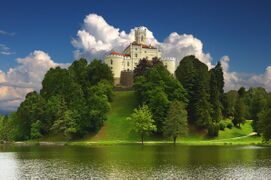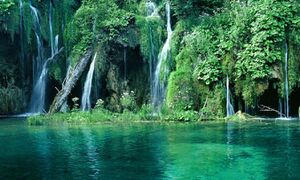Chrobonsk
Chrobonsk ("The Most Holy and Serene Tsardom of Chrobonsk") Пресвето и Свето Царство Хробонско (Suratian) | |
|---|---|
Anthem: | |
| Capital | Belgrini |
| Largest city | Srimonsk |
| Official languages | Suratian Latin Greek |
| Ethnic groups | Suratii |
| Religion | Caphiric Catholocism |
| Demonym(s) | Chrobonskian (noun) Chrobonski (adjective) |
| Government | Mixed Monarchy |
• Tsar | Flamur Milos Chrobonsk II |
| Legislature | Chrobonskian Parliament |
| Parliamentary Council | |
| Duma | |
| Establishment | |
• Royal Marriage of Dimitri Chrob and Maria Onsk | c. 1250 |
| Currency | Chleb (chb) |
| Driving side | right |
| Calling code | +75 |
| Internet TLD | .cb |
Chrobonsk, officially the Most Holy and Serene Kingdom of Chrobonsk, is a country in Sarpedon. It is neighbored by Caphiria, Zeshinava, and Aciria.
Chrobonsk is a member of the League of Nations.
Etymology
Chrobonsk is portmanteaux formed from the wedding of the founding monarchs of the Kingdom - King Dimitri Chrob and Queen Maria Onsk.
History
Chrobonsk was for most of its history a land of loosely confederates counties and duchies surrounding the southern river inlet of Sarpedon. The kingdom itself was formed when a royal marriage was formed between the two most powerful houses of the region, forcing the less powerful noble entities in the region to bend the knee. While never becoming a true imperial power, The Tsardom remains regionally powerful, and a historically neutral nation in most regional and international conflicts.
Bronze Age
The first settlements and city states were formed up and down the great river basin (placeholder name) that flows through the nation by the indigenous Sarpedonian tribes that we now ethnically know as the Suratii. While in the bronze age they were more than likely much more ethnically and culturally diverse to be lumped into one ethnic group, the Suratii eventually became more culturally and ethnically salient Though much is lost of these ancient cultures, it is known that their main source of income was trading wine and barley up and down the river.
Suratii Kingdoms
The disjointed kingdoms of the region rarely had any interactions at all with foreign powers, with the exception of the fledgling Caphirian Republic, whose trade allowed the early city states to flourish into actual political entities.
Breakaway states
What modern historians consider to be the beginning of Chrobonskian history would be the formation of the Breakaway Kingdoms. These were once nobles loyal to the Caphirian Empire who, in the midst of the chaos, decided to form their own kingdoms.
The Wedding at the Mouth
Eventually, two quasi-coalitions formed on either side of the river (placeholder). One side ruled by House Chrob, the other by House Onsk. While historically bitter rivals, the two houses saw an opportunity to unite and form a state for all Suratii peoples.
The Long Peace
Chrobonsk never partook in Imperial expansion, instead focusing on exporting a diverse array of goods to the Imperial powers. Such as wine, gunpowder, and textiles. During this time, however, Chrobonsk did suffer a great rebellion against the monarchy due to lack of labor legislation and poor wages and working conditions. A compromise was made in the formation of the Parliamentary system, allowing citizens to have a voice in the running of the nation.
Modern Chrobonsk
While the Kingdom of Chrobonsk was at one point an incredibly wealthy and powerful nation from its mercantile outlook during the industrial revolution, it had to answer the call to arms twice in honor of a centuries old alliance with Caphiria in both world wars and the subsequent cold war. Beyond that, however, Chrobonsk saw a great economic boom in the 1980s - which paved the way for drug and organized crime problems that still persist. Internationally, Chrobonsk is known for gangster movies made during this time, as well as pop music and a genre called "Turbofolk".
Geography
-
The Governmental Palace of Chrobonsk, located in downtown Belgrini
-
The City of Krep, located at the outlet of the great river (placeholder). A popular vacation spot for tourists both foreign and domestic.
-
The National Cathedral in Srimonsk
-
A Statue of King Dimitri I of House Chrobonsk
-
The historic home of the Royal Family of Chrobonsk.
-
A pool of fresh water and waterfalls, deep within the Royal Forestry Service's Nature Reserve.
Chrobonsk is settled predominately around a great river basin known as the (placeholder)
Climate and environment
Chrobonsk has tropical climates closer to its coastline, but a majority of its land is very temperate and in many places in the north of the country, cold.
Government and Politics
Executive
All decisions in the country must be ratified by the King, he also has the power to veto any legislation he desires - unless a unanimous vote is made in the parliament to overturn his decision. This has only ever happened twice in the history of the nation.
Legislative
The Chrobonskian Federal Parliamentary Council and the Chrobonskian Duma draft bills and make a majority of political decisions. However, part of the King's duty as monarch is to read over these bills as he has his people's best interests at hearts.
Federal subdivisions
The Nation is divided into four main provinces (Placeholder, Placeholder, Placeholder, and Placeholder)
Politics
The ruling party of Chrobonsk is currently the Christian Democrats, but there is a small minority of Nationalists in the Duma and the Parliament. Communist and Socialist parties are banned in the nation.
Law
Chrobonskian law is considered by some draconian, and its punitive system is considered to be in violation of human rights due to its treatment of prisoners, use of firing squad as execution, and a relatively liberal death penalty sentencing system. Drugs are banned in the nation, but there is a push to legalize marijuana. Ironically, psilocybin mushrooms are completely legal and are a staple in many rural communities - the government exempts these mushrooms from scheduled substance classification as they are "Culturally Significant".
Demographics
What kind of people live in your country?
Ethnicity
What ethnic groups make up your country?
Language
What language or languages do your country's people use? Are there any previously used languages no longer common? Are these languages native to your country or shared with another?
Religion
Religious affiliations in the XXX (20XX)
What do your country's people believe in religiously, if anything? How many groups are there?
Education
How many people in your country are educated?
Culture and Society
What do your people do, and what are they like?
Education
What is your country's education system like? How do the schools work? What do people think about education?
Attitudes and worldview
How do your country's people view life?
Kinship and family
How are families or kinship groups structured in your country?
Cuisine
What do your people eat?
Religion
What do your people believe? Rather than demographics, as above, think about how important religion is to your people and their view about their own and other religions. What is the relationship between the prevailing view and minority religious groups? Is it an official religion, and do any laws exist about free worship?
Arts and Literature
What type of art do your people make? Do they have a tradition of painted art, well-crafted television shows, or great music?
Sports
Does your country have any major sports leagues? What types of sports are played, both professionally and for fun by your country's people?"
Symbols
Are there any prominent symbols which are well known to represent your country?
Economy and Infrastructure
How does your country's economy work?
Industries and Sectors
What are the largest parts of your economy in terms of what they do?
Currency
What exchange systems are used within your country's economy?
Healthcare
How do people in your country procure medical care? How is it paid for?
Labor
How is labor organized within your country? Are there any social institutions or unions which deal with labor concerns?
Transportation
How do people in your country get around? Is there a major highway system as well as sea- and airports?
Energy
What type of energy keeps your nation going? Are you renewable or use fossil fuels, and if you are renewable, how recently did your country transition?
Technology
How advanced is your country? Is it an innovator, or does it largely import new developments?
Military
How large is your country's military? Is it large but poorly equipped or small and elite? Does your country have a martial tradition?


